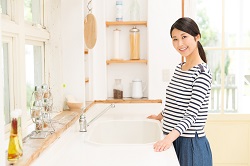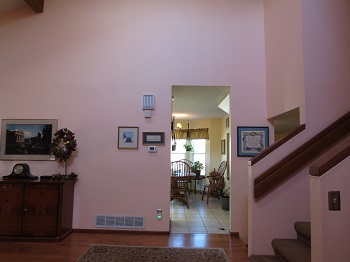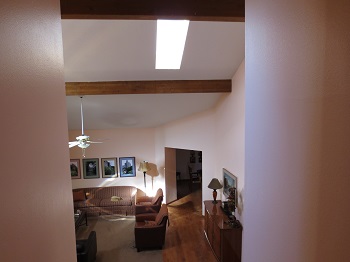 I wrote about the “hedonic treadmill” last summer, a concept dealing with how we adapt to pleasure, especially as that pleasure relates to possessions. So, for example, when I first poked my head into the entryway of our house I thought I was going to pass out from excitement. When I come in the front door now do I have that same almost-unbearable sense of pleasure and anticipation? Of course not. My friend Clover said once when she had come upstairs with me and was going back down, “Wow, this is such a wide-open vista from up here!” And she was right. Coming down those stairs does indeed open up a beautiful view. I try to remind myself of her comment when I’m coming downstairs, but most of the time, let’s face it: I don’t pay any attention.
I wrote about the “hedonic treadmill” last summer, a concept dealing with how we adapt to pleasure, especially as that pleasure relates to possessions. So, for example, when I first poked my head into the entryway of our house I thought I was going to pass out from excitement. When I come in the front door now do I have that same almost-unbearable sense of pleasure and anticipation? Of course not. My friend Clover said once when she had come upstairs with me and was going back down, “Wow, this is such a wide-open vista from up here!” And she was right. Coming down those stairs does indeed open up a beautiful view. I try to remind myself of her comment when I’m coming downstairs, but most of the time, let’s face it: I don’t pay any attention.


So, what’s the solution? I’m planning a post on the concept of the relationship between Christianity and Stoicism at some point, but I’m not quite ready to write that. Here are some points for now:
1. Pleasure, as I define it, relates to the purely physical. There is absolutely nothing wrong with experiencing pleasure in and of itself. It’s just that we have to accept that it’s always short-lived. That’s a great feeling that comes when the shower first hits the top of my head in the morning, but then it’s over. I can’t stay in the shower all day. So, paradoxically, truly enjoying pleasure means constantly letting it go–paying attention in the moment, while it lasts, and then moving on. I think if you learn to do that, taking pleasure in small doses, as it were, you won’t be so tempted to amp up the treadmill. You won’t say about a perfectly adequate house or car, “It no longer meets my needs!” I often wonder about the people who go through the incredible house renovations portrayed on “This Old House”–how long do they really enjoy that gorgeous bathroom with that custom tile and the carefully-restored clawfoot tub and the antique ceiling fixture? Most of the fun and satisfaction, I would suspect, come in the renovation work itself. The pleasure of the end product probably doesn’t last very long.
How depressing! Ah, but there’s more . . .
2. Happiness comes from right actions, perhaps from having cleaned up the kitchen, like the woman in the first picture. (Those of you who have read my book know that I’m obsessed with cleaning up the kitchen, mostly because mine is so often a mess.) I don’t find that the happiness of looking at an orderly room fades the way looking at an expensive purchase does. (Perhaps at some future time I’ll post a picture of the cheapest item in my closet, a $5 jacket from a thrift store, and the most expensive one, a $250 jacket from a craft fair, and discuss how much pleasure each one gives me.) You don’t have to keep amping up right actions the way you have to keep amping up mere pleasures, and nowhere is this more true than in our relationships. I can have an open-hearted, respectful conversation with my husband today, and tomorrow I can have the same thing, and the day after that. The right actions keep building on each other, not diminishing. On the other hand, well, one eye-rolling moment can cancel out a number of respectful ones.
So happiness can be built, but pleasure can only be experienced and then relinquished. What do you think? Does this dichotomy play out in your life?